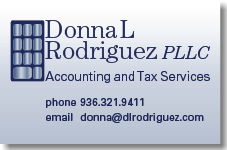Brokers must track and report cost basis
Generally, when you sell, exchange or otherwise dispose of a capital asset (most property you own and use for personal purposes, pleasure, or investment is a capital asset, including your house, furniture, car, stocks, and bonds), you report it on Form 1040, Schedule D. However, there are changes to the reporting requirements.
Many transactions that previously would have been reported on Schedule D or D-1 must now be reported on Form 8949. Complete Form 8949 before you complete line 1, 2, 3, 8, 9 or 10 of Schedule D. Form 8949 replaces Schedule D-1.
· Brokers must now report the adjusted basis and whether any gain or loss on a sale is classified as short-term or long-term from the sale of "covered securities" on Form 1099-B.
· "Covered securities" are generally shares of corporate stock acquired on or after January 1, 2011.
· Shares of stock in mutual funds and stock acquired in connection with a dividend reinvestment plan are generally not covered unless acquired after January 1, 2012.
· Certain other types of securities (e.g., debt instruments and options) will be covered if acquired after January 1, 2014.
You can tailor your reporting method to suit your tax situation
The regulations allow you to determine in advance what accounting method you wish to use for each sale of stock. Most broker-dealers will designate a default option to use if you do not specify a method. That default will typically be the so-called FIFO method (an acronym for "first in, first out"), which means that the first shares of a security purchased are considered the first shares sold. However, your broker might also allow you to specify LIFO ("last in, first out") or designate specific shares as the ones sold. In some cases, such as shares bought through a direct reinvestment program, using an average cost basis for all shares may be most convenient (most mutual fund companies already employ this method of calculating cost basis).
You may be able to put in a standing order specifying the method you want to use for all trades, or choose on a case-by-case basis; you may also authorize your financial professional to make that decision for you. The rules permit investors to change the designated method for a given trade until the settlement date (the date on which money actually changes hands, which for a typical stock sale is three days after execution of the trade). After the trade settles, you cannot change your mind about the method used. Brokers also will be required to report losses that are disallowed as a result of a wash sale (which occurs when shares are sold and then repurchased within 30 days).


